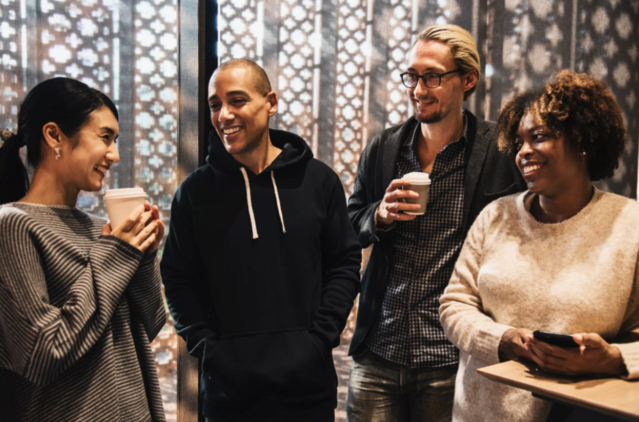Health
The Future of Diversity in America
Insights into how Americans respond to increasing diversity.
Posted February 27, 2021 Reviewed by Kaja Perina

- The U.S. is becoming more diverse, with a growing majority non-white, multi-ethnic population.
- People readily adapt to societal diversity, and they also benefit from it.
- For proper integration, political leaders must set the right tone.
- Younger workers now avoid companies that lack a diverse workforce.
- Seeing others share positive, inclusive attitudes increases tolerance as well.
American society is increasingly diverse. That’s a reality. This transition is generating a positive, welcoming embrace among some; and fear, even opposition and hatred, from others. Both responses have a direct impact on shaping political and social policy in all areas of society. That includes the workplace, the definition of “family,” as well as social and cultural traditions. All of which can alter what we define as a “true” American.
Demographic data reveal what’s happening: The U.S. is headed towards a majority non-white, multi-ethnic, multi-racial society within the next few years. Already, the majority of births fall within that growing majority, as do the populations of California, New Mexico, and Texas.
Given this societal shift, it would be helpful to look at what we really know about how people think, feel, and respond to it. What can we observe about the actual impact of diversity upon people’s personal lives, their aspirations; even their health?
Here are a few illuminating, research-based discoveries:
People Adapt When Exposed to Diverse “Others”
A recent joint study from Princeton and Oxford Universities has particular significance for everyday life, and also for political leadership, which is critical. It found that people can and do adapt to societal diversity, and they also actually benefit from it. Moreover, those in power especially set the tone for integrating people into our ever-evolving society. The research acknowledged that segments of our society feel threatened by what they perceive as a changing definition of America as they have known it, and expect it to remain. But those insecurities are unwarranted: The study found that with time, people can adapt and also experience new benefits from diversity. “If you give people who are different from you half a chance, they will integrate into society pretty well. It is when you purposefully push them out, or erect barriers against them, problems are introduced,” said Princeton’s Douglas Massey. And “It’s important for our political leaders to set the right tone, so proper integration can occur.”
The research was based on examining 22 years of psychological, sociological, and demographic data from three sets of data, described more fully here, and was published in the Proceedings of the National Academy of Sciences (PNAS).
Young Workers Make Diversity and Inclusion a Requirement
Writing in the Washington Post about the changing workplace, Jennifer Miller recently reported that Millennial and Gen Z workers will avoid companies that lack a diverse workforce. And that includes seeing a commitment from management to confront systemic racism within the company; its pathways to promotion and reward. Miller cites one example of a younger generation member who examined a potential employer for its emphasis on diversity, equity, and inclusion. She also scanned reports on Glassdoor, LinkedIn, and Indeed, looking for employees’ reviews about that company’s policies; all criteria for her regarding whether to pursue employment there.
Miller quotes Alvin B. Tillery Jr., director of the Center for Diversity and Democracy at Northwestern University, who emphasizes: “This is a generational shift in the belief that these values are really important and foundational to their experiences as workers.” “You can say there’s no systemic racism, but millennials and Gen Z don’t believe that. If you’re under 35, you expect these conversations, and if you don’t offer them, you’ll have trouble recruiting.”
Tolerance to Diversity Is Perceived as a Norm
Similarly, research from the University of Wisconsin found that showing people how their peers feel about diversity in their social circles increases their positive feelings and attitudes about it. That is, seeing or hearing that others in their milieu share positive, inclusive attitudes about diversity – that they see it as the norm -- increases their own tolerance.
As lead researcher Markus Brauer pointed out, “In any other domain of public health, it's the key thing to communicate: It's the right thing to do, your peers do it, and your peers would actually approve of you doing it as well." The study assessed participants’ attitudes about appreciation for diversity and related measures over about 12 weeks. It found that those exposed to seeing diversity as a social norm reported more positive attitudes towards members of other groups, and stronger endorsement of diversity. The study was published in the journal Nature Human Behavior.
Inclusion Is Linked With Healthy Thriving Throughout Life
This report from The Gerontological Society of America examined the health impact of inequities based on peoples’ skin color, where they live, their sex, and who they love. Included was the impact of the COVID-19 pandemic. From that perspective, the report described that corporations and other employers have a beneficial effect when enhancing diversity and inclusion. Specifically, such efforts increase “longevity fitness,” which the report describes as to how people can thrive, not just survive throughout increasingly long life spans, by achieving social, health, and wealth equity.
The Urban Institute’s Richard W. Johnson, who chaired the report’s development, said: “Our nation’s diversity is one of its great strengths, but we have marginalized certain groups and made it difficult for them to accumulate financial, health, and social equity.” And, “This report shows how government and business can work together to help everyone thrive throughout their lives.” The report calls for deep cultural shifts in the race, gender, and sexual orientation/identity aspects of life, to promote “longevity fitness.”
On the Verge of a New America
The broadest implications of growing diversity and its increasing impact upon people’s lives were recently described by Charles Blow in The New York Times, in writing about what he calls: “Four great migrations” underway in our society. He indicates that the impact of climate change on the United States is likely to lead to millions of climate migrants in the coming decades. But, he emphasizes, there are at least three other upheavals at the same time, to which individual lives and our society will have to respond: immigration from other countries; urbanization led by younger people; and the reverse migration of Black people from cities in the North and West back to the South.
We’re looking at major league diversity, then, that lies ahead for everyone.
As Blow writes, “Great migration movements are going to dramatically change America in the near future, upending the geography and structures of power, and it is hard to see how the country emerges on the other side of it. We may well be on the verge of a New America, a reshuffled United States, in which power, to some degree, is redistributed and exercised by emerging power players and power centers.” And, “America as we have come to know it is likely a thing of the past. Migratory movements have continually reshaped this country and that trend shows no signs of ending.”




